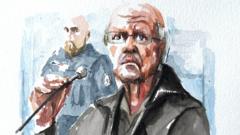Le Scouarnec, once a trusted figure in medicine, has been sentenced to 20 years in prison for the extensive abuse of 299 victims, primarily children, during his medical career spanning from 1989 to 2014. Standing impassively in court, he received the sentence from Judge Aude Burési, who emphasized the manipulative nature of his crimes, particularly against vulnerable and incapacitated individuals. This sentence includes a mandatory minimum of two-thirds, which could see Le Scouarnec eligible for parole by 2030, taking into account his previous seven years served for separate child sexual offenses.
Victims expressed outrage at the sentence’s perceived leniency, highlighting the devastation of their lives in the wake of his actions. "Twenty years is little compared to the number of victims in this trial," remarked Francesca Satta, a lawyer representing some of these victims. Meanwhile, Amélie Lévêque, a victim, voiced her distress at the possibility of Le Scouarnec returning to society, a sentiment echoed by many survivors who feel they have lost their normalcy while he seems to regain his life.
Le Scouarnec's confession during the trial included acknowledging the deep psychological scars left on his victims, including instances of suicide linked to their trauma. Convicted in a previous case in 2005 for possessing paedophile material, he continued to operate, raising questions about the medical system that allowed him to practice despite red flags.
Victims took to protesting outside the courthouse, decrying society's failure to acknowledge the systemic issues that let the abuse continue unchecked. A statement from the collective of victims pointedly noted the silence of both the medical community and politicians regarding preventive measures following his extensive history of abuse.
Many survivors, disenchanted by his courtroom demeanor, expressed skepticism regarding his remorse. Yet, his lawyer, Maxime Tessier, defended his client, suggesting that the lengthy trial provided a cathartic moment for Le Scouarnec to confront his actions. The National Order of Doctors has issued an apology for not preventing his continued practice, acknowledging the failure in communication among medical authorities that failed to protect innocent lives.
As France grapples with the ramifications of this high-profile case, the call for systemic reforms to safeguard against such predatory behavior persists, with survivors hoping for greater legislative changes in the future.
Victims expressed outrage at the sentence’s perceived leniency, highlighting the devastation of their lives in the wake of his actions. "Twenty years is little compared to the number of victims in this trial," remarked Francesca Satta, a lawyer representing some of these victims. Meanwhile, Amélie Lévêque, a victim, voiced her distress at the possibility of Le Scouarnec returning to society, a sentiment echoed by many survivors who feel they have lost their normalcy while he seems to regain his life.
Le Scouarnec's confession during the trial included acknowledging the deep psychological scars left on his victims, including instances of suicide linked to their trauma. Convicted in a previous case in 2005 for possessing paedophile material, he continued to operate, raising questions about the medical system that allowed him to practice despite red flags.
Victims took to protesting outside the courthouse, decrying society's failure to acknowledge the systemic issues that let the abuse continue unchecked. A statement from the collective of victims pointedly noted the silence of both the medical community and politicians regarding preventive measures following his extensive history of abuse.
Many survivors, disenchanted by his courtroom demeanor, expressed skepticism regarding his remorse. Yet, his lawyer, Maxime Tessier, defended his client, suggesting that the lengthy trial provided a cathartic moment for Le Scouarnec to confront his actions. The National Order of Doctors has issued an apology for not preventing his continued practice, acknowledging the failure in communication among medical authorities that failed to protect innocent lives.
As France grapples with the ramifications of this high-profile case, the call for systemic reforms to safeguard against such predatory behavior persists, with survivors hoping for greater legislative changes in the future.




















